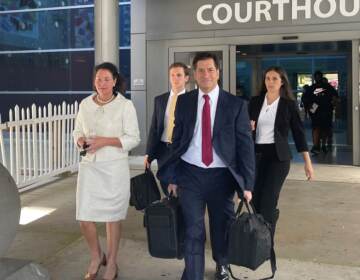Delaware’s convicted auditor could actually be removed from office and still get re-elected
Gov. Carney says he’ll execute his duty to oust McGuiness once she’s sentenced for her crimes. Yet voters will make the final decision on her political future.

In this 2018 file photo, Delaware State Auditor Kathleen McGuiness addresses supporters during a Democrat Watch Party at the Doubletree Hotel in Wilmington, Delaware. (Saquan Stimpson for WHYY)
So this could really happen.
Let’s say Kathy McGuiness, Delaware’s first-term auditor, wins her Sept. 13 Democratic primary against a political newcomer.
The victory would come exactly two weeks after a judge upheld a jury’s verdict that she was guilty of misdemeanor conflict of interest and official misconduct for abusing the power of her office.
Then, later in September, while McGuiness prepares for her November general election race against a Republican first-time candidate, the judge sentences her to probation.
Gov. John Carney then performs what he says is his constitutional duty — removing her from office.
But the governor’s penalty can’t keep McGuiness off the ballot.
And in November, she could defeat her GOP foe in a state where Democrats hold a nearly 2-1 voter registration advantage and all nine statewide elective posts.
McGuiness would re-take office on January 4.
And voilà!
A criminal banished from office just weeks earlier could return to her job overseeing and often investigating spending by governments in Delaware.
The events could unfold differently, of course. Democrat Lydia York could win the primary in less than two weeks, or Republican Janice Lorrah could take the general election.
But the above scenario is one dreaded by politicians such as Senate Majority Leader Bryan Townsend.
“The idea that someone could be charged and can be convicted and be essentially all but sentenced and still be re-elected is a statement on society,’’ Townsend told WHYY News this week while acknowledging it’s a distinct possibility.
Townsend, who joined leaders of both the Senate and House this week in again urging McGuiness to resign, lamented the fact that the auditor has “continued to campaign for weeks and months now as if nothing is wrong, nothing to see here,’’ Townsend said. “I think we’re in a different world now where the public seems to accept that more, as President Trump showed.”

Trump, who was impeached twice during his term as president, is still considered the Republican frontrunner for the 2024 nomination should he decide to run, even while under criminal investigation in a number of jurisdictions.
Judge upholds two McGuiness convictions for abuse of office
The chances that McGuiness could be removed and then retake office crystallized this week after Superior Court Judge William C. Carpenter, Jr. upheld two guilty verdicts related to hiring her college-age daughter to a job in her office during the pandemic.
Carpenter overruled another jury guilty verdict, however, and acquitted her of structuring a contract with her office for a campaign consultant in violation of state procurement policies. Carpenter also denied her bid for a new trial.
McGuiness’s attorney, Steven P. Wood, issued a statement this week that made clear the auditor was determined to keep fighting to clear her name and battle for her political future.
“Once sentenced, Ms. McGuiness intends to appeal her conviction to the Delaware Supreme Court, where we will point out the legal and factual errors that led to her being wrongly convicted for a crime that she did not commit,’’ Wood said.
Carpenter’s ruling paved the way for sentencing, which as of Thursday he had not scheduled. Her two misdemeanors have a maximum sentence of one year in prison but no time behind bars is required. With no criminal history, she’s expected to get probation and a fine.
But Carney has said publicly that the auditor’s sentencing and formal pronouncement of her conviction would be his trigger to exercise his constitutional duty to oust McGuiness. The Delaware Constitution stipulates that “the governor shall remove from office any public officer convicted of misbehavior in office.”
Carney would not comment but spokeswoman Emily David issued this statement:
“Legally, that will occur when the auditor is sentenced. That said, the governor’s previously stated concerns remain — that it is difficult to understand how the auditor can continue to do her job effectively under these circumstances.”
So, unless Carpenter decides to sentence McGuiness before the primary, Democratic voters would first get their chance to render their own decision on whether she remains in office.
York is a relatively unknown candidate who practices law in the low-key world of wills, estates, and trusts. Even if she had political experience or had held a local office, her bid would normally be an uphill battle in Delaware, where the power of incumbency is formidable, especially against untested candidates.

Delaware has about 363,000 registered Democrats, and about 120,000 voted in the 2020 primary.
McGuiness, 55, is a pharmacist and business owner who previously served several terms as a Rehoboth Beach commissioner before sweeping to victory in the statewide race for the auditor’s seat in 2018.
She first won a three-way primary, taking 42% of the vote. In the general election, she won 58% of the vote, a margin just 1% below that achieved by four-term incumbent Sen. Tom Carper, a former congressman, governor, and state treasurer.
The Democrat elite clearly favor York, who was a virtual unknown before McGuiness was indicted, but with no political experience, it remains to be seen whether her campaign message of “transparency, accountability, leadership” has resonated with voters.
‘Sad statement on the standard we have in the world now’
With the primary election looming, York has echoed other political leaders calling for McGuiness to step down.
The incumbent’s crimes “show plainly that she cannot continue serving as an elected official,’’ York said after Carpenter’s ruling. “The people of Delaware deserve leaders who can be trusted to always do the right thing and to follow the letter of the law. The current auditor has done the opposite.”
While Democratic leaders are united in their desire for McGuiness to be ousted, they are in conflict about how that should be done.
The House decided not to move forward with a prolonged House impeachment hearing and then a Senate trial. If convicted in the Senate, McGuiness would have been barred under the state constitution from seeking elective office again. The avenue Carney seems determined to take doesn’t stop her from doing so.
After Carpenter ruled, Townsend joined Senate President Pro Tem Dave Sokola and Majority Whip Tizzy Lockman in reiterating in a joint statement that the auditor has “repeatedly refused to put the public’s interest ahead of her own.”
The Senate leaders, all Democrats, also noted that members had voted 13-7 on July 25 to hold legislative removal proceedings.
But House Speaker Pete Schwartzkopf, a Rehoboth Beach resident and friend of McGuiness, wouldn’t hold a separate hearing in the House to vote on having removal hearings.
He said his chamber would not be participating in the Senate’s “political theater” because removal proceedings also could take several days or weeks, and all legislators could do is urge Carney to remove her.
Since Carney has repeatedly stated that he would wait until her conviction was recorded at sentencing, Schwarzkopf said there was no point in going through the charade of a hearing.
Left unsaid was the fact that if hearings were to be held, Delaware’s 61 state legislators, whose seats are also at stake in the upcoming election, would need to be called back into session during their summer or fall recess, which would cut into their own campaigning time.
Schwarzkopf did not participate in a joint statement issued by House Majority Leader Valerie Longhurst or Majority Whip Larry Mitchell after Carpenter’s ruling.
The House leaders again urged McGuiness to step down and said Carney “is required to remove her” at sentencing.
“The people of Delaware deserve better,” Longhurst and Mitchell declared.
Sen. Townsend said he’s disgusted by the notion that McGuiness could be elected after conviction and removal.
“It’s a sad statement on the standard that we have in the world now, and a troubling statement about the power of incumbency in office,’’ he said. “If someone is able to go through this criminal process, be found guilty and still still win reelection, I think it calls for a very hard look at whether a different standard can be in place legally.
“I hope that the voters in the Democratic primary on September 13 also show that it’s not what government should be. And we’ll have to see how that goes.”
WHYY is your source for fact-based, in-depth journalism and information. As a nonprofit organization, we rely on financial support from readers like you. Please give today.







